
I finally got around to watching Sound of Metal and I found it to be a compelling and riveting story. There was nary an explosion to be found. No gunshots. No car chases. No breakneck action sequences. It was a slow, mostly quiet, deliberately paced story and I could not look away from it. You might ask, how could this be? How could a film with such a dearth of action and violence be so interesting in today’s movie environment? The answer is that it was a well-crafted, well-constructed story that had the solid foundation of a compelling and exquisitely executed Hero’s Journey.
What makes that statement all the more remarkable is that The Sound of Metal, as least after one viewing, skips a couple of key stages. There appears to be no Approach or Supreme Ordeal, and yet there is definitely a midway point in Act II where you can see the story changing direction from Act IIA and Act IIB. It’s a tad jarring, but it still works for this movie. Director Darius Marder also wrote the screenplay with cowriter Abraham Marder and what they did was create an Ordinary World and a Special World that both fit the classical definition of the Hero’s Journey by showing not only how the hero changes, but how his experience in the Special World changes, and how his journey changes his perception of each world.
There may not be any car chases, but the hero is chasing something throughout the entire film.
The hero of this story is Ruben (Riz Ahmed), a drummer in a heavy metal band with his girlfriend, Lou (Olivia Cook). Ruben’s Ordinary World shows him and Lou living in an RV that acts as a recording studio and rehearsal space. Their gigs are at small venues and they play so loud and with so much distortion that it’s almost impossible to understand the lyrics that Lou sings. Ruben is a recovering addict who’s covered in tattoos and has bleached his hair. Lou is barely holding on. She compulsively scratches her arm and her clothes and hair are a mess. They love each other, but this is a lifestyle that neither of them can sustain.
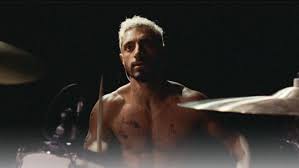
The inciting incident happens when Ruben starts to notice that he’s losing his hearing. This is devastating for a drummer in a Metal band, so he sees a doctor who tells him that it’s going to get worse. He could get surgical implants that could potentially save his hearing, but that would cost between $40K and $80K. Then during a gig, he realizes he can’t hear and he gets up and walks out, eventually confessing his condition to Lou.
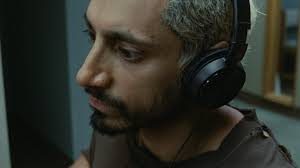
Here’s where the script finds its drama. The most compelling stories are the ones that pit what a character wants versus what that character needs. In Sound of Metal, Ruben wants to regain his hearing. What he needs is to find the peace within himself to accept his new reality. This comes to light when he receives his Call to Adventure. Lou finds out about a place that might be able to help him, but it’s in a different way than Ruben expects. It’s a home for the hearing impaired, and this is where Ruben experiences the Meeting with the Mentor. The mentor in this case is Joe (Paul Raci), the kindly man who runs the home. He’s also deaf and also a recovering addict. In classic mythology, the mentor often offers the hero some magical gift or provides the hero with his initial call to adventure. Joe, in archetypal fashion, does both. He offers Ruben the opportunity to live in the home and learn how to live as a hearing impaired person. Ruben, however, Refuses the Call because he sees himself as broken and he wants to be fixed.
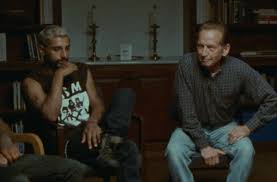
It is Lou, however, who finally pushes Ruben to Cross the First Threshold. She tells him that he has to do this, and she makes arrangements to go home to her father. A car comes to pick her up, and they share an emotional good bye. After she leaves in the car, Ruben tearfully walks back to the RV, looking back at the car a couple of times as it drives Lou away.
Ruben leaves the Ordinary World and Crosses the Threshold to the Special World of the adventure when he moves into the home. As a part of the Tests, Allies and Enemies stage of the journey, he has to give up his cell phone and the keys to the RV as a condition of living there. He’s also tested by the fact that everyone else there knows sign language and he does not, making him feel even more like an outsider. He literally does not understand this world or the people in it, and he fails every test laid before him.
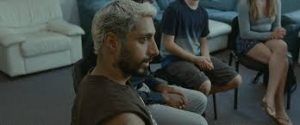
Here’s where as a director, Darius Marder showed his chops. The pacing of the second act is brilliant. Ruben slowly learns how to navigate in this new world. He slowly learns the language. He slowly accepts kindness from the people in it, and then he starts to return that kindness. He finds a home in the Special World, but he still doesn’t want to be there. He still wants his hearing back. This is shown through an exercise that Joe gives to Ruben. He instructs Ruben to go to his study early every morning and just sit and be quiet. If he feels the need to do something, he should write. It doesn’t matter what. Just write. But Ruben can’t just sit and be quiet. He has an insatiable desire to keep moving and to lash out. It’s beyond his power at the moment to accept the peace that silence brings.
Act IIB shows Ruben taking some initiative to get his hearing back. He sells all of his recording equipment and the RV, and that gets him enough money to get the surgery. In an interesting bookend to Lou’s departure, the RV pulls away down the road, and he walks away in the other direction, showing no emotion and never looking back. He gets the surgery and can hear again, but it’s not the same. It’s tinny and sounds like a radio that’s having difficulty finding the signal. He tells Joe that he got the surgery and asks Joe for some financial help, but Joe refuses. He tells Ruben that he hopes he finds happiness, but this house is for people who don’t feel broken by being deaf, and he needs to move out right away.
Act III has Ruben on The Road Back and returning to the Ordinary World, but it’s different and he’s different. In his Resurrection, he’s cropped his hair short, symbolic of the inner change he’s experienced, and he goes to find Lou at her father’s house. He’s welcomed in, but Lou is different. She’s cut her hair as well, and she’s wearing nicer clothes. She’s also stopped scratching her arm, and she looks much healthier than she did before. Ruben is invited to a party at the house and he notices that the implants cause him to hear everything at the same level. He can hear everything the same, so he really still can’t hear anything. He later talks to Lou about getting back out on the road, but the thought of that gets her to start scratching her arm again and Ruben finally accepts the fact that his world will never be the same. The Return With the Elixir shows him leaving the next morning. He experiences the same overwhelming sound as he walks through the city. He hears everyone’s voice. He hears every ambient sound. Finally a bell in a clocktower gets him to turn off his implants and everything goes silent. Then, for the first time, he actually sees the world. He sees its silent beauty and he finds the peace that has eluded him.
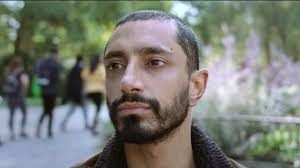
What makes this Hero’s Journey so effective is the clear difference between the Ordinary World before Ruben goes to the Special World and after he emerges. He can hear again, but it’s not the same. He sees Lou again, but she’s changed. In fact, the Special World changed Ruben as well. He looks different with his implants sticking out of his ears and his cropped hair. But he’s changed on the inside as well, as represented by the different way he hears. He can’t go back to the way he was. The old world is gone and it’s never coming back. The old Ruben is dead and new Ruben has been resurrected in his place.
The only thing for him to do is to embrace the new person that he is and the new world in which he lives.
There is one other thing that I need to briefly touch on about Sound of Metal that doesn’t really have anything to do with the screenplay, but has everything to do with the story, and that is the sound. I’ve always been a proponent of the notion that sound is half of your film. It’s an unappreciated concept that is often taken for granted by the audience. But because the primary relationship in this movie was between the main character and sound, sound takes a large role in this film. There are the obvious times when the mix is done in such a way as to represent Ruben’s hearing loss, but there’s something else. Watch the film again and listen for the ambient sound. When they’re at the house, you can hear the wind blowing, You can hear birds chirping. All of that is brought way up in the mix, allowing the audience to hear what the characters cannot. It’s a huge part of the movie that should not be missed.